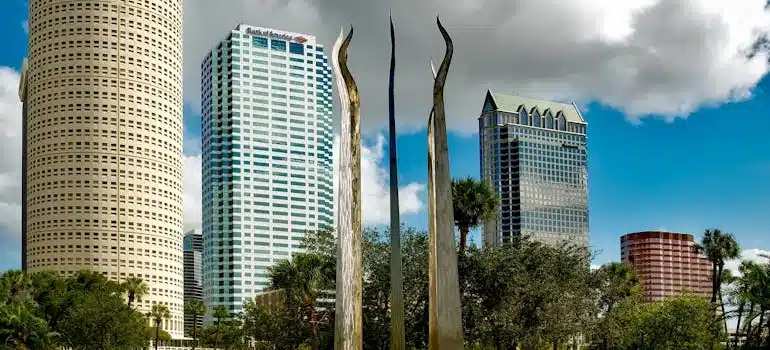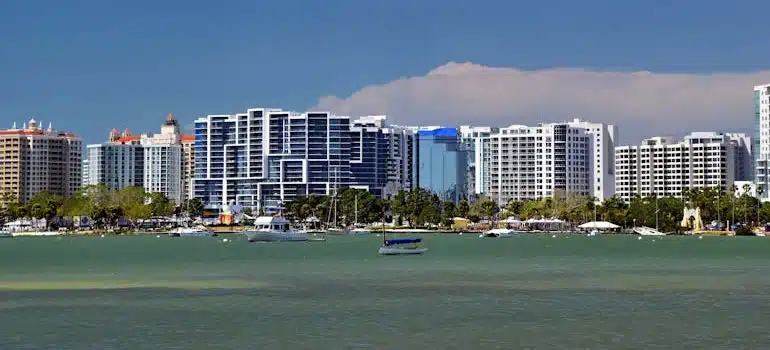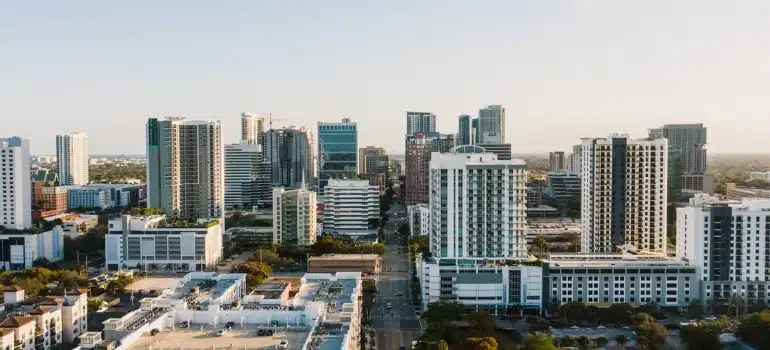The best cities for freelancers in Florida
Freelancers have more freedom than ever to choose where they live and work. In Florida, that choice comes with real advantages: no state income tax, strong local industries, and a growing network of coworking hubs. Picking the right spot can define your daily routine, client opportunities, and long-term growth. This guide by one of the best moving companies in Miami highlights the best cities for freelancers in Florida so you can find the place that fits both your work and lifestyle.
How we ranked Florida cities for freelancers
Over one million Floridians now work as freelancers or independent contractors. And yet, not every city in Florida offers the same support for freelancers. To create this list, we’ve considered several factors:
- Cost of living: rents, utilities, and coworking memberships.
- Client access: industries that hire freelancers and local event calendars.
- Infrastructure: internet speed, coworking availability, and airport connections.
- Business setup: ease of registering a business and handling taxes.
- Lifestyle: community size, parks, cafes, and cultural opportunities.
Each city balances these factors differently. Some are stronger for tech and media work, while others favor design, research, or healthcare. This makes the choice personal, based on your niche and goals.

Quick Florida freelancer facts to set the stage
Florida has several advantages for freelancers and professionals looking for a place to start a business. The state does not tax personal income, which allows professionals to keep more of their earnings. However, insurance and housing costs can differ sharply between regions.
Hurricanes can also affect budgets, especially for those who need reliable internet and workspace year-round. Florida’s airports are essential for freelancers who travel, since most cities rely heavily on cars.
Coworking hubs are growing in popularity, offering day passes and monthly memberships. Many cities also support creative communities through meetups, networking events, and university partnerships. Taken together, these details shape the daily life of freelancers across the Sunshine State.
The best cities for freelancers in Florida at a glance
Florida is not a one-size-fits-all market for freelancers. Each city offers a different mix of affordability, clients, and lifestyle. Here’s a quick snapshot before the detailed breakdown:
- Miami – Best for tech, media, and international opportunities
- Tampa – Best for affordability with access to major clients
- Orlando – Best for creative industries and event-driven work
- St. Petersburg – Best for arts, nonprofits, and coastal living
- Jacksonville – Best for freelancers seeking more space on a budget
- Fort Lauderdale – Best for real estate, aviation, and hospitality contracts
- Sarasota – Best for design, wellness, and boutique projects
- Gainesville – Best for education-focused or research-based freelancers
- Tallahassee – Best for government and policy-related work
- West Palm Beach – Best for finance, healthcare, and luxury clients
Some freelancers value fast access to clients and networking events, while others care more about affordable housing or a relaxed coastal lifestyle. The detailed breakdowns ahead will show how each city supports freelancers, with insights on costs, industries, community networks, and everyday living.
Miami
Miami stands out as Florida’s most global city, with more than 450,000 self-employed residents in Miami-Dade County alone. Freelancers here benefit from major industries like fintech, media, fashion, and hospitality, where average freelance rates often run 15–20% higher than in other Florida markets. Networking events and international conferences offer a direct link to clients worldwide.
Housing, however, remains a challenge. Median rents hover around $2,300 for a one-bedroom, among the highest in the state. Many freelancers lower costs by living inland in areas like Little Havana or Allapattah. Coworking is another strength: popular spaces average $250–$350 per month for a desk. Internet speed averages 250 Mbps, though backup hotspots are a must during storm season.
With over 37 million passengers yearly, Miami International Airport connects freelancers to Latin America, Europe, and U.S. hubs. The trade-off comes with higher insurance, parking fees, and hurricane preparation costs. Freelancers moving here often turn to professional moving services in Miami to handle the logistics, allowing them to focus on settling into their new workspace and tapping into the city’s global opportunities.

Tampa
Tampa has become a fast-growing hub for independent workers, with the metro adding nearly 100,000 new jobs in 2023, many linked to healthcare, cybersecurity, and digital services. Freelancers benefit from lower living costs compared to Miami. The median rent for a one-bedroom is around $1,750, while coworking memberships typically range from $200–$275 per month.
Internet speeds average 230 Mbps, providing solid reliability. Tampa International Airport, handling nearly 23 million passengers annually, connects freelancers easily to national clients. The local community fosters collaboration, with startup incubators and regular networking events hosted by the Tampa Bay Tech association.
The city’s affordability means freelancers keep more of their earnings, though car ownership is almost unavoidable. Summer humidity and heat can feel draining, but Tampa’s growing industries, lower costs, and accessible flights make it a smart base for professionals seeking balance.
Orlando
Orlando attracts freelancers in entertainment, hospitality, and gaming, while its emerging tech scene continues to expand. The region welcomed more than 74 million visitors in 2023, creating constant demand for marketing, design, and digital services. Beyond tourism, the tech corridor supports AR/VR and software professionals.
Housing costs are mid-range, with median one-bedroom rents around $1,800. Freelancers often save by living in suburban areas like Winter Park. Coworking memberships average $225–$275, while internet speeds reach 240 Mbps, strong enough for heavy remote workloads.
Freelancers who relocate often weigh the cost of housing alongside the value of moving insurance, since protecting equipment during a move is just as important as finding the right workspace. Orlando International Airport serves 50 million passengers a year, offering both domestic and international flights. SunRail provides some local transit options, though a car remains useful. The city’s steady calendar of conventions and trade shows helps freelancers secure short- and long-term contracts.
St. Petersburg
St. Petersburg has become one of the top FL spots for digital nomads and the best cities for freelancers in Florida in creative fields. The local economy supports design, arts, marketing, nonprofit work, and marine industries. A growing number of startups and small agencies also hire freelancers for digital and content services.
Median rent for a one-bedroom averages around $1,750, slightly lower than neighboring Tampa. Housing near the waterfront costs more, but affordable options exist in inland neighborhoods. Coworking memberships usually range from $200–$260, with downtown offering the highest concentration of hubs. Internet speeds average 230 Mbps, keeping remote work reliable.
The city’s cultural life stands out, with galleries, studios, and casual networking events that connect freelancers to both clients and peers. St. Petersburg’s location also provides quick access to Tampa’s larger market while offering a smaller, community-focused lifestyle. The main drawbacks include limited late-night transit and higher costs in tourist-heavy districts.

Jacksonville
Jacksonville is Florida’s largest city by land area, and its freelance market reflects that scale. Industries like logistics, fintech, healthcare, and defense fuel steady demand for independent professionals. The city’s lower living costs appeal to freelancers looking for more space and flexibility.
Median one-bedroom rents average around $1,500, among the lowest in major Florida metros. Freelancers also find coworking spaces priced competitively, typically $175–$225 per month. Internet speed averages 220 Mbps, with coverage spreading across neighborhoods as the city invests in infrastructure. Many professionals starting fresh rely on local movers in Florida to handle the practical side of relocation while they focus on setting up their new home office.
Jacksonville International Airport serves around 7 million passengers annually, smaller than Miami or Orlando but well-connected to domestic hubs. The city’s size means travel times vary widely, making neighborhood choice important for freelancers with in-person clients. Jacksonville’s affordability is its biggest strength, but distances between areas and fewer nonstop flights add challenges for those who travel often.
Fort Lauderdale
Fort Lauderdale offers a polished environment for freelancers working in yachting, aviation, hospitality, real estate, and related industries. Its proximity to Miami expands the client pool while offering a slightly calmer lifestyle and lower living costs. Many agencies in the region subcontract freelance projects, giving independents access to steady work.
Median rent for a one-bedroom runs around $2,000, though inland neighborhoods provide savings compared to coastal properties. Coworking memberships average $225–$300, with executive-style offices more common than casual shared desks. Internet speeds average 250 Mbps, supporting freelancers in high-bandwidth work like video or design.
Fort Lauderdale-Hollywood International Airport serves 36 million passengers annually, offering strong national and international connections. The Brightline train also links Fort Lauderdale to Miami and West Palm Beach in under an hour.
The city’s upscale image attracts corporate clients, but freelancers must navigate high living costs, seasonal spikes in demand, and parking expenses. Many relocating professionals rely on movers in Fort Lauderdale to handle the heavy lifting, which frees up time to focus on building networks and securing contracts in this competitive market.
Sarasota
Sarasota has become a strong choice among the best cities for freelancers in Florida in the creative and wellness industries. Fields like design, boutique retail, and arts-focused services thrive here, supported by a community that values independent professionals.
Creative freelancers with collections or studio pieces sometimes depend on art movers who understand how to transport delicate or high-value items safely. The city also attracts seasonal residents, creating demand for marketing, consulting, and lifestyle services.
Median rent for a one-bedroom averages $1,950, with coastal properties pushing much higher during peak season. Many freelancers choose inland neighborhoods to manage housing costs. Coworking memberships average $200–$275, offering quiet, creative environments rather than large-scale corporate hubs. Internet speeds run near 240 Mbps, with reliable service in most areas.
Sarasota-Bradenton International Airport handles fewer flights, so many professionals rely on Tampa International for broader options. The city’s cultural scene, anchored by museums, theaters, and galleries, provides strong networking opportunities.

Gainesville
Gainesville offers freelancers a college-town environment with steady opportunities in education, research, and biotech. The presence of the University of Florida drives demand for content, communications, and design projects tied to academic and healthcare sectors. The youthful energy of the city also supports creative freelancers in fields like marketing and digital media.
Median rent for a one-bedroom averages $1,450, making Gainesville one of Florida’s more affordable cities. Coworking spaces are clustered near the university, with memberships averaging $150–$200 per month. Internet speeds average 220 Mbps, strongest in areas closest to campus.
Gainesville Regional Airport is small, so freelancers often travel to Jacksonville or Orlando for wider flight options. The university’s research grants and student organizations provide a built-in market for freelancers, though semester cycles can affect project flow. Gainesville appeals to high-tech pros who want lower costs and a strong intellectual community.
Tallahassee
Tallahassee serves as the government hub, making it one of the best cities for freelancers in Florida in policy, legal, communications, and education-related fields. State agencies, universities, and advocacy groups create ongoing demand for contract-based work. The professional community leans heavily toward civic and nonprofit projects, giving freelancers access to consistent but specialized opportunities.
Median rent for a one-bedroom sits around $1,400, keeping housing costs manageable. Many freelancers use home offices, though coworking memberships average $175–$225 per month in central areas. Internet speeds average 210 Mbps, sufficient for most professional workloads.
Tallahassee International Airport serves around 1 million passengers yearly, with limited direct flights. Many professionals connect through Atlanta for wider access. Those arriving from outside the state usually work with long-distance movers in Florida, which simplifies the logistics of bringing both personal belongings and office equipment.
Freelancers working here benefit from strong ties to government clients but need to adapt to procurement rules and longer contracting processes. For those in education and policy niches, Tallahassee provides stability and a professional network not found in Florida’s coastal markets.
West Palm Beach
West Palm Beach provides a polished market for freelancers working with finance, healthcare, luxury services, and real estate. The area attracts corporate clients who value professional, contract-based work, making it ideal for consultants, marketers, and design specialists. Its proximity to Miami and Fort Lauderdale expands opportunities while maintaining a more manageable pace of life.
Median rent for a one-bedroom is around $2,100, with coastal neighborhoods commanding higher prices. Inland housing remains slightly more affordable. Coworking memberships cost between $250–$325, offering well-equipped spaces that cater to professionals seeking privacy and executive amenities. Internet speeds average 250 Mbps, making the city reliable for digital-heavy work.
Palm Beach International Airport serves over 7 million passengers annually, providing quick access to major U.S. destinations. The Brightline rail adds another layer of convenience with fast trips south to Miami or north to Orlando. Freelancers drawn to West Palm Beach benefit from its corporate networks, but higher housing costs and HOA restrictions in some communities may create obstacles.

Cost comparison snapshot of monthly freelancer basics
Costs vary across Florida’s cities, but certain expenses remain central for freelancers. Here’s a snapshot of typical monthly costs:
- Housing: one-bedroom rentals range from about $1,400 in Gainesville or Tallahassee to over $2,300 in Miami.
- Coworking: memberships average $175–$200 in smaller cities and $250–$350 in larger metros.
- Internet: fiber packages typically cost $70–$90 per month, with speeds averaging 220–250 Mbps.
- Car insurance: premiums vary widely, from $200 to over $300 monthly, depending on city and driver history.
- Parking: downtown Miami and Fort Lauderdale can add $100–$200 per month in fees.
These numbers give freelancers a clearer picture of day-to-day expenses. Comparing housing and workspace costs among the best cities for freelancers in Florida often makes the biggest difference when choosing a city.
Finding clients fast in each market
Securing clients quickly is often the priority after settling in. Florida’s major cities provide freelancers with several paths to build a client base:
- Join local Slack and Discord groups focused on tech, design, or marketing.
- Attend Chamber of Commerce networking events.
- Explore subcontracting pipelines with regional agencies in Miami, Tampa, and Fort Lauderdale.
- Connect with universities and hospitals that rely on contract professionals.
- Track convention and event calendars to find short-term, high-value projects.
The mix of industries varies by city, so freelancers should adapt strategies to fit local demand. Orlando favors entertainment and events, Tallahassee offers government contracts, and Miami opens global doors.
Legal, taxes, and setup checklist
Freelancers moving to Florida need to understand the basics of setting up their business. Registering a sole proprietorship or LLC is straightforward and can be done online through the Florida Division of Corporations. While the state does not tax personal income, certain counties may require a business license if you plan to work from home. Sales tax rarely applies to freelance services, but it’s wise to check specific industry rules.
Invoices should always include client information and payment terms. Many freelancers rely on online invoicing tools that also generate financial records for tax season. Hurricane season adds another consideration, so having digital backups of contracts, invoices, and client files is essential for uninterrupted work.

Insurance and risk planning for Florida
Insurance often gets overlooked, but it plays a central role in protecting freelancers. General liability coverage helps cover claims if client projects or equipment cause issues. Many independent professionals also choose health plans with HSA options, which reduce taxable income while offering flexibility for medical expenses.
Hurricanes and power outages pose real risks. For data protection, external hard drives and cloud storage act as critical safeguards. Some also keep a backup workspace in coworking hubs to avoid interruptions during outages. Thinking through these risks in advance prevents costly downtime later.
Housing and workspace strategies
Choosing housing in Florida comes down to balancing affordability with internet access and commute times. Inland neighborhoods in Miami or Fort Lauderdale save money compared to coastal zones. In cities like Gainesville or Tallahassee, freelancers enjoy lower rents and easier access to parking, which helps keep budgets predictable.
Many freelancers combine a home office with part-time coworking. A few days each week in a coworking hub supports networking, while home setups cut costs. Asking about fiber internet before signing a lease is also smart, since reliable speeds are essential for most freelance work. Parking is another hidden cost. In dense areas, monthly fees quickly add up, so negotiating space in a rental agreement can help.
Choosing your best-fit Florida city: decision framework
Selecting the right Florida city depends on both professional and personal priorities. A structured approach helps narrow the options:
- List your top three industries or client types. For example, tech, healthcare, or creative.
- Compare housing costs and coworking prices in each target city.
- Check flight options and airport access if travel is part of your business.
- Score each city on community resources such as meetups, startup hubs, or arts groups.
- Weigh lifestyle factors like beaches, cultural events, and the overall pace of life.
Once you’ve scored each factor, choose the city with the strongest balance for the next 12 months. Relocating is easier when you have a clear decision framework, reducing the chance of regret later.

Sample 90-day launch plan after you move
Starting out in one of the best cities for freelancers in Florida works best with a structured timeline. A 90-day launch plan keeps freelancers focused:
- Weeks 1–2: Set up the internet, register your business, and create a dedicated workspace.
- Weeks 3–4: Update online profiles and directories, then build a local outreach list.
- Month 2: Attend at least three events, join a coworking hub, and pitch five new retainers.
- Month 3: Evaluate progress, refine service offerings, and set clear quarterly income goals.
A practical plan builds momentum and ensures relocation turns into real business growth rather than a long adjustment period.
Tools and resources for Florida freelancers
The right tools make freelancing in Florida easier. Several resources stand out:
- Coworking finders like Deskpass to compare flexible workspaces.
- Airport guides for tracking flight routes and connections.
- Power outage trackers during hurricane season.
- State and county chambers of commerce for networking.
- Free contract templates and accounting apps tailored for independent workers.
These resources support freelancers as they adapt to new markets and handle daily challenges. Leveraging local and digital tools saves time, protects income, and expands opportunities.
Pick your base, build your pipeline
Finding one of the best cities for freelancers in Florida for you is about choosing the city that fits your style, budget, and goals. Each city has trade-offs, but the common thread is opportunity. A strong start comes from making informed choices, planning, and setting clear business milestones. So, if Florida is your next base, weigh the options carefully, build your network early, and treat relocation as the launchpad for a sustainable freelance career.
